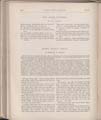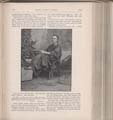
stnic.188403.001.001.jpg
Wong Ning's Ideas.
[WONG NING is no imaginary character. He is a real, flesh-and-blood Chinese boy, living in San Francisco, and much interested in the new and many-sided life going on about him. So we are glad to give you, in his own words, a few of his observations on American life and manners.
Our correspondent, Mrs. Ella Sterling Cummins, who sends us Wong Ning's portrait, says in her letter, written from San Francisco: "Although the Chinese are so numerous here and so intimately connected with our domestic routine, they are reticent, and rarely speak of their native land, though greatly attached to its memories. In fact, the thoughts and expressions of home life that I have gleaned, are almost as unfamiliar to Californians as to Eastern people, because of this reticence. Wong Ning, or 'Charley,' as he likes to be called, is a very intelligent fellow with very sound ideas; and he sees many things in the way of customs and habits among Americans of which he disapproves as strongly as we disapprove of certain customs among the Chinese. Some of these 'ideas' are comical; some sensible. As it is a departure to look upon ourselves through Chinese eyes, I thought, perhaps, it might interest your readers; so I gathered together just a few of his expressions for your perusal. While following the idiom, I have not attempted to give the pronunciation, for it would interfere with the ideas and divest them of clearness. Besides, an intelligent Chinese does not indulge in the absurd, 'You heapee likee,' as the litterateur would have us believe; but takes great pride in talking as well as possible. I also send a photograph of Wong Ning.]
MY name Wong Ning. I born on home China, come to this country when thirteen years old, and been here now seven year.
Little boy have very hard time on home China. Have to get up and go to school at six o'clock,—very early that,—come home, get breakfast at eight o'clock, and lunch at twelve o'clock; then stay till six o'clock in the day. I no think American boy like that!
Little girl no go to school at all! Very funny, that! Have one big house, on home China, where all the girls go every day; learn to sew, make the pretty things, the flowers, the birds, everything! by the needle. Little girl no speak to the boy—no! never! on home China.
On home China every one like the mother very much; give everything to she. If a China boy no like the mother, no work hard for she, no send she everything—Oh! horrible! very bad! All the sons marry, bring home the wife to wait on she. Not like the wife so much as the mother, on home China.
The woman—the wife, the mother, the little girl—all work in the house— sew, cook, make the cloth, everything! When they make the dinner or the lunch, set the table very nice, put on everything; then run behind the curtain (no have any door on home China), and then the man—the father, the son, the little boy—all come in, sit down, eat the dinner; eat him all up. Pretty soon, by and by, the woman—the mother, the wife, the little girl— come quiet, lift up the curtain. If he all gone, can come eat; if no, can not come. Yes! sure!
This place not the same like on home China. Everything more different.
I go to school at night, learn to read and write; I think English very hard.
I been work for the Jew family, the Irish family, and the Spanish family. I
think my English get too much funny—

stnic.188403.001.002.jpg so many kinds of language. Now I work
for the American family; like it more better.
I been here so long, and go to school so much, that I understand the English more better than China. Very funny that! When my cousin, at the wash-house, send me the letter to come take dinner with he, he have to write it in English, and the lady I work for, she laugh very much.
I get one letter this morning. (My American name, Charley.) Here the letter:
"Mr. Chily. you Please come to Kum Lee this evening to take dinder, beacuse Lee chong go to home China this week. Ah Do and Ah Sing all come in to if soon as you can
"good by Wong Voo."I know plenty stories about on home China. You ever hear about Kong-foo-too ?—American call him Confucius—he very great man.
Maybe you like, I tell you one story. Kong-foo-too—he travel all over China. He live about two, three thousand year ago, yes! sure! He travel every city, teach Chinaman— that very good.
One city he no came,—that Canton,—one very big place inside three big walls. Kong-foo-too, or Confucius, he come to Canton, and try to come in the gate—very big gate.
One little boy there, seven years old. I think that little boy too smart. He making play of a little city, and building three little walls around it, all the same like Canton. He took up too much room, and talk too smart, so that Confucius can not get in.
He watch him a little while, then he say, "I guess Canton all right, this boy can teach Canton. I go some other place." That very bad! Next year that boy die— very strange that! So Canton never get any teaching, not from boy, not from Kong-foo-too. I think not very good for little boy to be too smart.